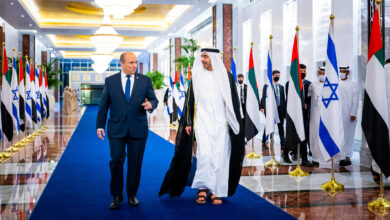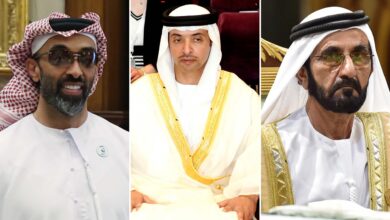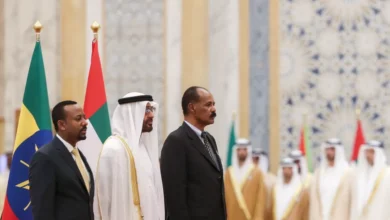Rebuilding Gaza at Gunpoint: Bahrain and UAE Warn U.S. Against Reconstruction Without Disarming Hamas
By Dark Box | October 17, 2025

In the shadow of one of the deadliest wars in modern Middle East history, where over 35,000 Palestinians have been killed and most of Gaza lies in ruins, a chilling ultimatum is emerging from two of Washington’s closest allies in the Gulf. According to well-informed diplomatic sources, the United Arab Emirates (UAE) and the Kingdom of Bahrain have warned the Biden administration that they will not participate in—or fund—the rebuilding of Gaza unless the United States guarantees that Hamas is dismantled and its armed wing permanently neutralized.
This conditional approach marks a dramatic escalation in how some Arab states are using humanitarian aid as leverage in the broader geopolitical struggle for postwar influence in Gaza—and signals a dangerous shift in the moral calculus of regional reconstruction politics.
A Caution Cloaked as a Threat
The warning, reportedly conveyed through backchannel communications and private consultations in recent weeks, links financial support for Gaza’s reconstruction directly to American enforcement of postwar terms on Hamas. Sources familiar with the Gulf positions say that Abu Dhabi and Manama are demanding a “guaranteed demilitarization mechanism,” including:
- Full disarmament of all Hamas brigades and affiliated militant factions;
- A clear pathway to a non-Hamas technocratic or Arab-led transitional authority in Gaza;
- U.S. oversight or commitment to enforce any violation of demilitarization terms;
- A postwar political order in which groups resisting normalization with Israel are politically excluded.
A senior Arab diplomat described the stance as “a thinly veiled veto on any Palestinian-led recovery process that fails to conform to the Abraham Accords vision.”
The UAE’s Vision: Gaza Without Resistance
The Emirati leadership, in particular, views the Gaza war not only as a humanitarian crisis but as an opportunity to redefine the Palestinian political map. Over the past five years, Abu Dhabi has aggressively sought to insert itself as a regional kingmaker—from Sudan to Yemen to the West Bank—most notably through its patronage of exiled Palestinian figure Mohammed Dahlan.
In this context, Emirati officials argue that pouring billions into a Gaza still under the influence of Hamas would be tantamount to funding terrorism. Their alternative? A “stabilization and reconstruction plan” that would see pro-Accords Palestinian technocrats, possibly tied to Dahlan’s network, assume control—with Gulf money flowing in once U.S. and Israeli forces clear “hostile actors.”
The problem: no Palestinian constituency has requested this arrangement, and resistance to such external engineering remains strong across political and civil society lines.
Bahrain’s Echo Chamber
Though less politically assertive than the UAE, Bahrain has mirrored Abu Dhabi’s messaging. Bahraini diplomats have reportedly voiced concern that any premature reconstruction could allow Hamas to regroup. A source familiar with the discussions says Bahrain has privately urged the U.S. to “tie every dollar of aid to concrete steps that weaken Hamas’s infrastructure.”
Critics say this is less about security and more about aligning with Israel’s postwar strategy, which continues to prioritize the fragmentation of Palestinian unity over sustainable peace.
The Human Cost of Conditional Aid
Meanwhile, the scale of devastation in Gaza continues to defy language: hospitals obliterated, schools turned into shelters-turned-graves, water systems collapsed, and famine encroaching from the south. The World Bank estimates that Gaza will require at least $45 billion for full rehabilitation—a number that may rise as the war grinds on.
With the U.S. administration now seeking partners for the anticipated reconstruction phase, the Gulf states’ conditions could delay critical life-saving infrastructure. In effect, humanitarian recovery has been turned into a political weapon.
“This is a starvation policy by proxy,” said a European diplomat stationed in Amman. “If aid becomes contingent on political reprogramming, then you’re not rebuilding Gaza—you’re using it to erase resistance.”
Normalization at the Heart of the Strategy
Analysts say the UAE and Bahrain’s positions are not just about Hamas. They are about controlling who governs Gaza—and ensuring that whoever does is amenable to the Abraham Accords framework. By conditioning their support on the dismantling of resistance, Gulf states hope to eliminate any future roadblocks to full Arab-Israeli normalization.
“If Gaza is rebuilt without political guarantees, it will remain a symbol of armed defiance,” says Middle East researcher Rasha Qudair. “That is what frightens the UAE most.”
Conclusion: Aid or Ultimatum?
In theory, postwar reconstruction should be a moment of unity, a chance to rescue civilians and rebuild a devastated society. Instead, it is becoming a new battlefield—where financial pledges are used as pressure points and aid is doled out only if the victors write the rules.
As the Biden administration weighs its options, it must confront the ethical question at the heart of this crisis: Will Gaza be rebuilt to serve its people, or rebuilt to serve the designs of foreign capitals?




